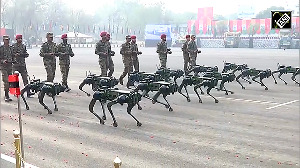Securing deadlines for the end of the 'trade-distorting' farm subsidies by the developed countries was, among other things, the most important victory for India at the WTO Ministerial in Hong Kong, said Commerce and Industry Minister Kamal Nath on Wednesday.
While replying to questions at the Rajya Sabha, Nath said: "Without this sentence (in the WTO declaration), the whole thing would have been rubbish for us."
He said this in response to a remark from BJP leader Murali Manohar Joshi that "India had merely accepted the EU's stand that it would reduce subsidies by 2013."
Nath said the finalisation of the percentage cut for reduction of industrial tariffs was also a significant achievement.
The minister defended the government on other aspects of the negotiations saying, "Before I went to Hong Kong, Parliament had told me not to cut de minimis support. I went a step further. There was an ambiguity in the July framework. The word "largely" had been mentioned in that document. That has been removed. Now developing countries can take recourse to self-designating special products with both price and quantity triggers."
He said Indian industrial products also needed market access, "so I argued that tariff peaks and escalations should be removed."
He said the difference between India's position this time and that in the previous WTO meets was that now "we were not negotiating from a position of weakness."
Earlier, Sitaram Yechury of the CPI (M) pointed out that till 2013, the EU and the others would not reduce export subsidies by more than 3.5 per cent while there was need for much more cuts. He asked for a clear definition of special and differential treatment.
Speaking at a press conference, former commerce minister and BJP leader, Arun Jaitely, picked several holes in Kamal Nath's statement. On the de-minimis subsidy, Jaitley said while the cap talked about 10 per cent, India only gave up to 3 per cent subsidy to farmers as a transport subsidy and that it was not a "great achievement for the government."
Regarding the self-selection of special products for subsidies, he said the number of special products should have been fixed in terms of percentage either at Geneva or Hong Kong. "Even now we are in the dark about the special products," he said.
On the issue of the special safeguard mechanism, Jaitley said it was a defensive mechanism, since after giving in to the demands of the developed countries in terms of lowering tariffs, the government needed to guard against a possible import surge.
Joshi, who was present with Jaitley, said setting a deadline for export subsidy reduction merely meant a loss of leverage.
"In any case, subsidies at about $4 million are a miniscule percentage of the overall trade support and trade package that the EU and the US give to their farmers," he said.






 © 2025
© 2025